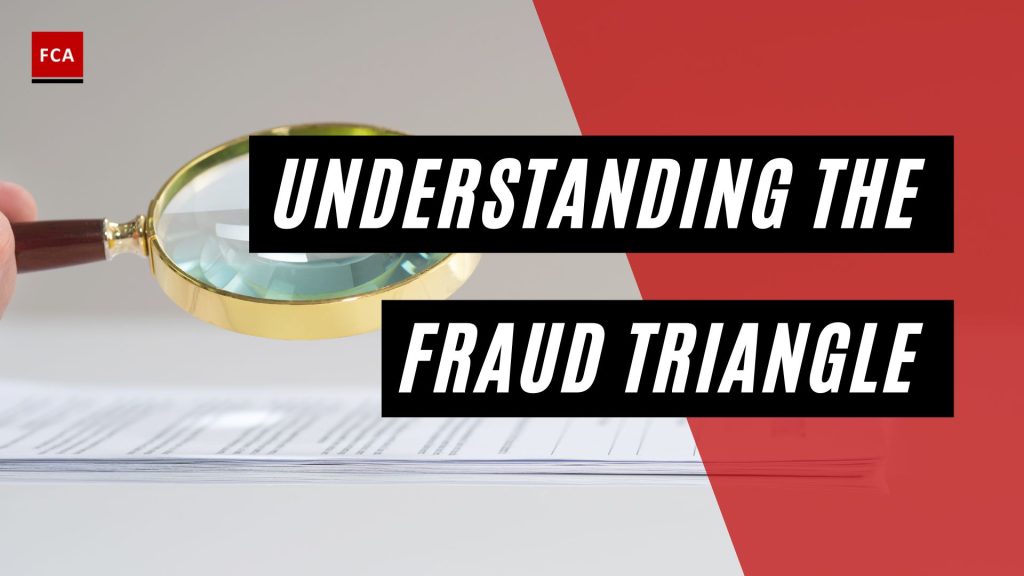Understanding the fraud triangle is crucial for organizations aiming to proactively identify and mitigate potential fraudulent behavior, as it helps decipher the complex interplay of motivation, opportunity, and rationalization that often precedes such illicit acts.
There is no single reason behind the occurrence of fraud. Whenever the fraud incident occurs, the need to look at the situation from the fraudster’s perspective is important. People must be given the option to commit fraud. This is usually due to a weak countermeasure, such as a lack of oversight. Often, the fraud begins small and then grows as the opportunity is confirmed.

Understanding the Fraud Triangle
Why Is Fraud Committed?
It is necessary to take into account of following factors:
- The motivation of potential fraudsters and the conditions under which they rationalized their behavior
- Opportunities available to commit the frauds
- Technical and power ability of the fraudsters
- The expected risk of discovery of the fraud activity, after it has been performed
- Consequences of fraud discovery such as penalties, punishments, etc.
The Fraud Triangle is a model that brings together a number of these aspects and the model tell us that the fraud usually results from a combination of three factors, which are as follows:
- Motivation,
- Opportunity and
- Rationalization.
Fraudsters may be professionals or opportunists. They may be motivated to commit fraud at the workplace to fulfill their financial needs and desires or they may be provided with an opportunity which they avail themselves and gain personal benefits. Some of the fraudsters rationalize the fraud activities.
Below are the fraud triangle components discussed.
Motivation
Motivation is based on either greed or the need of the fraudster. Greed continues to be the main cause of fraud in many countries and jurisdictions. Many people are faced with or provided with the opportunity to commit fraud.
The personality, knowledge, and temperament of the fraudster enable them to confidently commit the frauds and they are not the frightened people. There may be also the possibility that good people may fall into the bad company of the criminals who make them commit the frauds in the working places or the companies where these good people are employed.
For example, a bank employee may be used by the criminal to transfer the money from one location to another through opening an account with the bank, without any due diligence of the criminal.
Opportunity
Fraud usually occurs in companies, where there is a weak system of internal controls and poor security measures are implemented. Fraudsters exploit the weak internal control system and commit the activities to gain benefits.
Establishing robust internal controls is the responsibility of the Board of Directors and Senior Management of the company. Without appropriate and robust processes and controls, the operations of the company or organizations may not be run, causing various losses to the company such as operational, reputational, and financial losses. The financial position of the company deteriorates without appropriate internal controls.
A weak internal controls system means weak governance structure and poor policies and processes. Due to the weak internal control system, the organization is exposed to various types of risks, such as:
- Financial risk
- Reputational risk
- Operational risk
- Legal risk
- Regulatory risk
- Strategic risk etc.
Rationalization
Various people obey the laws and regulations of the country because they believe that compliance with laws and regulations is their main responsibility. These types of people are afraid of being exposed if they are found in any illegal activity or non-compliance with any law or regulation.
However, some people may be able to rationalize fraudulent acts and actions as:
- Necessary – especially when done for the business
- Harmless – because the victim is large enough to absorb the impact
- Justified – because “the victim deserved it” or “because I was mistreated.”
Final Thoughts
The complexity of fraud cannot be boiled down to a single determinant. Instead, it’s a confluence of factors encapsulated in the Fraud Triangle: motivation, opportunity, and rationalization. Fraudsters may be driven by personal needs or desires, seize opportunities provided by weak control systems, or rationalize their actions through various justifications. By understanding these elements, we can devise stronger preventative measures and more effectively curb the occurrence of fraud. Comprehensive understanding, robust internal controls, and fostering an environment of accountability are our best defenses against these illicit activities.









